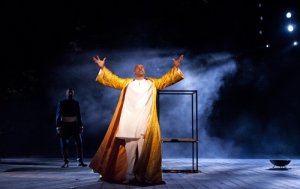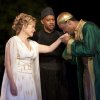An Exotic Wonder in Central Park
Hot- The Winter's Tale
- by William Shakespeare
- Public Theater
- June 9 - July 31, 2010
| Acting |  |
| Costumes |  |
| Sets |  |
| Overall |  |
No Shakespeare play quite has the element of unspoken magic that The Winter's Tale has, and though the verse is powerful and beautiful, it is the interpretation of the words that can breathe enchantment into the play, or make a ridicule of itself. For this summer's second offering from the Public for Shakespeare in the Park, Michael Greif steers his production towards a wintry land of wonder, emotional breadth and honesty, and the moments of mending and healing.
Mark Wendland arranges a suitable space for Leontes to hold court in, cushy chaises with formal living room rugs, fruit, lanterns, and small-burning fires bring regal homeyness to the opening scenes. But the most curious set piece is a half-circle off to stage left slightly upstage, angled into the stage like a giant discus embedded deep into the floor. The clear surface reveals the mechanics that keep it in place, and it's large enough to have a door cut into it.
The stunning costumes, carefully selected by Clint Ramos to flatter and characterize, are a visual feast. He differentiates between Bohemian and Sicilian style, the former having slightly more Asian influence, the latter leaning towards Arabic and Middle Eastern exotica. Leontes struts and prowls in a long, gold tunic, later with equally sumptuous white pajamas and burgundy robe, in the first half; in the second, he is in modest, humble clothes of mourning, painful regret in the black he wears. Hermione, striking in a striped aqua and white gown with a low-cut v-neck, is the epitome of sexy pregnant, until she emerges from her underground prison. Bohemia wears powerful colors, including a magnificent emerald and gold tunic in the reconciliation scenes. And a blue and gold livery for Leontes's guards subtly points to their importance in his life.
The play opens with fanciful play, as if every day at court includes dancers and ribbon twirlers and nothing consequential at all. Leontes dotes on his son; Polixenes and Hermione talk and laugh; Leontes and Hermione touch and kiss, showing courtly restraint in their affections. But when Leontes (Ruben Santiago-Hudson) spies Mamillius playing with Polixenes (Jesse L. Martin), as we can imagine he treats his own son in Bohemia, the conflict of the play is sparked. Deeply-rooted but unspeakable, there is a flicker of something that passes across Santiago-Hudson's face as he sees his friend playing with the boy. But is Leontes jealous of Polixenes with his son—strange, since he has a good relationship with him—or Mamillius, for taking his friend away? Will Hermione merely be the scapegoat for something primal, so dark that there are no words, no thoughts to describe it?
Thunder foreshadows the ominous scene of arrest, when Leontes enters his wife's chambers and demands she admit to crimes uncommitted. The storm continues as water runs down the window panes of the half-sphere, now standing upright to the stage. A little melodramatic, but the effect is so enthralling that it is easy to forget there is no actual rain. (Though I have no idea how Greif managed to make the winds perfectly crisp on my performance night.) Although Linda Emond as Hermione stands her ground and tries to reason with Santiago-Hudson, he will not hear of it. He roars and growls like the lion he is named, as he pushes away those who would help him and sinks further into his inner turmoil. A bedraggled but ethereally calm Emond stands trial, clothed in a rough shift instead of her queenly garments, and warns Leontes with compassion that he will regret his actions, but Santiago-Hudson is trapped in his own mire, quicksand of his own making. Kenneth Posner's low lights all around the circle stage create eerie shadows, turning a trial into a witch hunt.
But Hermione does have a secret weapon, advocating for justice and reason with raw feminine power. Marianne Jean-Baptiste as Paulina matches Leontes roar for roar, a lioness in her own right. Jean-Baptiste's dynamic vitality, paired with intelligent cunning, emphasizes that Paulina is Leontes's most-trusted advisor for a reason—not only looking out for Hermione, but for the king and country as well. Some productions depict her as a nurse-like handmaid, who surely wouldn't stand up to this wrathful, single-minded monarch, but I would want this Paulina on my defense counsel. She does not have her guns blazing all the time; the strong connection that she has with dry, witty Antigonus (Gerry Bamman) is comforting in its realness, and Jean-Baptiste's later grief is befitting, honoring their marriage together in service of their king.
We do see a possible hint that Santiago-Hudson may know he is wrong, but he is so afraid and so stubborn that he will hide in his convictions. Until he pisses off the oracle. (Did anyone learn from the Greeks? Don't piss off the gods.) And still—when Emond collapses dead on the defense stand, and Santiago-Hudson takes the full meaning of Apollo's power—he is more afraid than remorseful, more terrified of the consequences than sorry for the cause.
In the second act in Bohemia, Hamish Linklater as Autolycus is a sad slight to behold: dirty long johns, a foolish daffodil hat, seemingly drunk. Although he is a rogue, and a good one, he is lost and seems to have little delight in his games; he misses serving Florizel, though he knows his trickery may be irredeemable. His former master Florizel (Francois Battiste) speaks clearly and beautifully, poetry tripping off the tongue, but his gestures seem very contemporary but not glaringly so. Heather Lind as Perdita is beautiful in a white one-shouldered draped dress, but her twittery voice and skittish nature doesn't match with the earthy goddess of fertility that hosts their festival. But she takes Polixenes's rage as best she can, as it is formidable and devastating; Martin's treatment of Perdita strangely mirrors the wrath of Leontes toward Hermione as he rages and threatens everything she holds dear.
Whereas Leontes is no longer the lion-man he once was. Marinating in years of regret and guilt, Santiago-Hudson projects an icy peace, understanding that he will have no opportunity for redemption. From our vantage, Jean-Baptiste is not very sly at keeping her secret but it entices Leontes all the more, to see what Paulina has been up to all these years. And much to our pleasant surprise, Hermione is not in on the secret either; the amazement on Emond's face as she slowly takes in her environment, then lights upon her visitors, is breathtaking, maternal, and all-encompassing in its forgiveness. Michael Greif has other tricks up his sleeves, but to reveal them here would be to lessen the wonder, to define a feeling, confine a thought as it leaves you, or to capture an intangible moment. Some things are better left unsaid.
Discuss this review or play in our forums
Reviews on this site are subject to this required disclosure.













